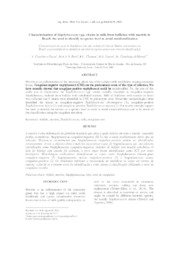Characterization of Staphylococcus spp. strains in milk from buffaloes with mastitis in Brazil: the need to identify to species level to avoid misidentification.
Characterization of Staphylococcus spp. strains in milk from buffaloes with mastitis in Brazil: the need to identify to species level to avoid misidentification.
Author(s): COIMBRA E SOUZA, V.; BRITO, M. A. V. P. e; CHAMON, R. C.; LAPORT, M. S.; GIAMBIAGI DE MARVAL, M.
Summary: ABSTRACT - Mastitis is an inflammation of the mammary gland that affects dairy cattle worldwide causing economic losses. Coagulase-negative staphylococci (CNS) are the predominant cause of this type of infection. We have recently showed that coagulase-positive staphylococci could be misidentified. So, the aim of this study was to characterize the Staphylococcus spp. strains initially classified as coagulase-negative Staphylococci, isolated from buffalo with subclinical mastitis. Milk of buffaloes with mastitis in herds was collected and 9 strains were identified as CNS by phenotypic tests. Molecular methodologies latter identified the strains as coagulase-negative Staphylococcus chromogenes (5), coagulase-positive Staphylococcus hyicus (2) and coagulase-positive Staphylococcus aureus (2). Our results strongly support the need to identify the isolates to a species level in order to avoid misidentification and to be aware of the classification using the coagulase test alone. RESUMO - A mastite é uma inflamação da glândula mamária que afeta o gado leiteiro em todo o mundo, causando perdas econômicas. Staphylococcus coagulase-negativa (SCN) são a causa predominante desse tipo de infecção. Mostrou-se recentemente que Staphylococcus coagulase-positiva podem ser identificados erroneamente. Assim, o objetivo deste estudo foi caracterizar cepas de Staphylococcus spp. inicialmente classificados como Staphylococcus coagulase-negativa, isolados de búfalas com mastite subclínica. O leite de búfalas com mastite foi coletado, e nove cepas foram identificadas como SCN por testes fenotípicos. Metodologias moleculares identificaram as cepas como Staphylococcus chromogenes coagulase-negativa (5) Staphylococcus hyicus coagulase-positiva (2) e Staphylococcus aureus coagulase-positiva (2). Os resultados reforçam a necessidade de identificar as cepas em termos de espécie, a fim de se evitarem erros de identificação e estar atento à classificação utilizando o teste de coagulase sozinho.
Publication year: 2017
Types of publication: Journal article
Unit: Embrapa Dairy Cattle
Keywords: Buffalo, Coagulase test, Staphylococcus, mastitis, milk
Observation
Some of Embrapa's publications are published as ePub files. To read them, use or download one of the following free software options to your computer or mobile device. Android: Google Play Books; IOS: iBooks; Windows and Linux: Calibre.
Access other publications
Access the Agricultural Research Database (BDPA) to consult Embrapa's full library collection and records.
Visit Embrapa Bookstore to purchase books and other publications sold by Embrapa.

